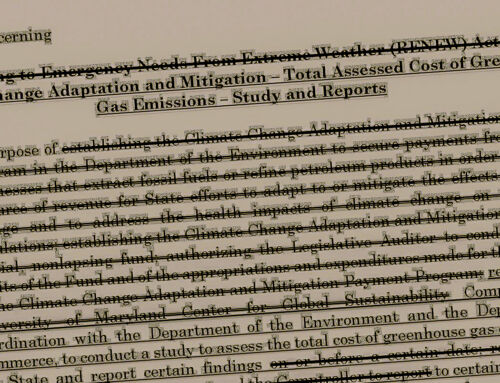View by Topic
Recent Articles
-
EPA Will Keep Current Limits for “Forever Chemicals” in Drinking WaterSaturday, May 24th, 2025
-
Court Indefinitely Pauses SEC Climate Rule LitigationSaturday, May 17th, 2025
-
Maryland is About to Regulate Mold But is the Cart Before the HorseSaturday, May 10th, 2025
-
New Environmental Laws from the 2025 Maryland Legislative SessionSaturday, April 26th, 2025
View by Month/Year
“Green Building Law Update” Headlines
Recent Articles & News from
Stuart Kaplow’s blog
at GreenBuildingLawUpdate.com
- EPA Will Keep Current Limits for “Forever Chemicals” in Drinking Water May 25, 2025
- Court Indefinitely Pauses SEC Climate Rule Litigation May 18, 2025
- Maryland is About to Regulate Mold: But is the Cart Before the Horse? May 11, 2025
- BEPS Redux: The Most Far Reaching Environmental Legislation of the 2025 Maryland General Assembly May 4, 2025
Subscribe to the Green Building Law Update!
Stuart Kaplow brings his expertise and extensive experience to the table with his unique digital publication, "Green Building Law Update". Subscribers receive regular updates to keep them informed about important issues surrounding Environmental Law, Green Building & Real Estate Law, as well as the emerging demand for Environmental Social Governance (ESG).
Get fresh content through the lense of Stuart Kaplow's cutting-edge expertise, innovative commentary and insider perspective. Don't miss another issue! Subscribe below.

Reverse Greenwashing: The Battle Over ExxonMobil’s Recycling
In the devolving discourse on the role of businesses in climate change responsibility, we are witnessing an unusual, but likely positive phenomenon, “reverse greenwashing.” Traditionally, greenwashing refers to businesses exaggerating or fabricating their environmental initiatives to appear more sustainable. Reverse greenwashing, however, occurs when environmental groups and public officials unjustly discredit legitimate business sustainability efforts, potentially for political or competitive reasons.
A high profile example of this is the recent lawsuit filed by ExxonMobil against California Attorney General Rob Bonta and several environmental organizations, including the Sierra Club, Surfrider Foundation, Heal the Bay Baykeeper, and the Intergenerational Environment Justice Fund Ltd. ExxonMobil alleges that these parties engaged in a deliberate campaign to discredit its advanced plastic recycling initiatives, spreading misinformation and defamation to undermine the company’s sustainability efforts.
The crux of the 40 page complaint is the averment, “with apparently no appreciation for the irony of their claim, Mr. Bonta and his cohorts are now engaging in reverse greenwashing; while posing under the banner of environmentalism, they do damage to genuine recycling programs and to meaningful innovation.”
Background of the Lawsuit
ExxonMobil, one of the world’s largest producers of plastic, has been investing heavily including in advanced recycling technologies aimed at converting hard to recycle plastics into reusable materials. This technology, if successful, could revolutionize plastic waste management by reducing landfill contributions and creating circular economies in the many industries that use plastic.
However, according to ExxonMobil’s complaint, Attorney General Bonta and various environmental groups have labeled these initiatives, including in a lawsuit brought last September by Mr. Bonta against ExxonMobil, as a “sham” and “myth,” casting doubt on the legitimacy of ExxonMobil’s recycling efforts including by disparaging this one business by blaming it for “the fact that the U.S. recycling rate has never exceeded 9%.” The company argues that this is not just criticism but an orchestrated attempt to harm its reputation and business interests.
Allegations of Reverse Greenwashing
ExxonMobil’s lawsuit highlights three core allegations:
1. Defamation and False Statements. The lawsuit claims that the defendants have knowingly spread falsehoods about ExxonMobil’s recycling efforts, accusing the company of misleading the public when, in fact, it has made substantial investments in legitimate sustainability solutions.
2. Coordinated Smear Campaign. The complaint alleges that Bonta and the environmental organizations have strategically reversed their stance on recycling, choosing to attack ExxonMobil’s initiatives despite previously advocating for similar technologies. This alleged shift was a “deliberate smear campaign” in Bonta’s “personal capacity to drive up donations and publicity for his political campaign.”
3. Foreign Influence. ExxonMobil further claims that IEJF, an Australian charity with financial ties to competing businesses, including through its relationship with ExxonMobil business competitor Fortescue Metals Group Ltd, has influenced U.S. based organizations to engage in this campaign. The company asserts that foreign actors may be attempting to manipulate the U.S. regulatory landscape to hinder ExxonMobil’s competitive edge in the global energy sector.
The Legal Battle and Its Implications
Filed in federal court in Beaumont, Texas, ExxonMobil’s lawsuit seeks compensatory and punitive damages, as well as injunctive relief to prevent further dissemination of false and defamatory claims. The outcome of this ‘turnabout is fair play’ case could set a significant precedent in how corporate sustainability efforts are assessed and challenged in the public sphere.
It should be lost on no one that late last year, in a first of its kind victory for a business, a New York state judge ordered the Greenwashing Lawsuit Alleging Plastic Pollution by PepsiCo is Dismissed. In your face responses by businesses are a positive change.
The Bigger Picture: When Environmental Advocacy Becomes Political
At a time when many in the environmental industrial complex are focused on the Executive Orders of the new Trump organization, there is also important action in the judicial branch. This case raises key questions about the intersection of environmental activism, politics, and corporate responsibility. Are companies genuinely attempting to improve sustainability being unfairly vilified for political or financial gain? And how should business respond?
While skepticism toward environmental claims by businesses and governments is at times warranted, we are now in a time when ‘fatalism is out and localism is in’, so dismissing legitimate innovations without due diligence may not only hinder progress in addressing global environmental and sustainability challenges but expose one to jeopardy. The ExxonMobil case underscores the need for a balanced approach, one that encourages both good practices by a business and a fair discourse on sustainability initiatives.
As this legal battle unfolds in what is a very different political time from when the defendants originally disparaged ExxonMobil, it will be crucial for businesses large and small to watch how courts navigate the complexities of reverse greenwashing, corporate responsibility, and the influence of political and foreign interests, in shaping environmental narratives.
The complaint should be required reading. It is at ExxonMobil_v_Bonta.pdf









